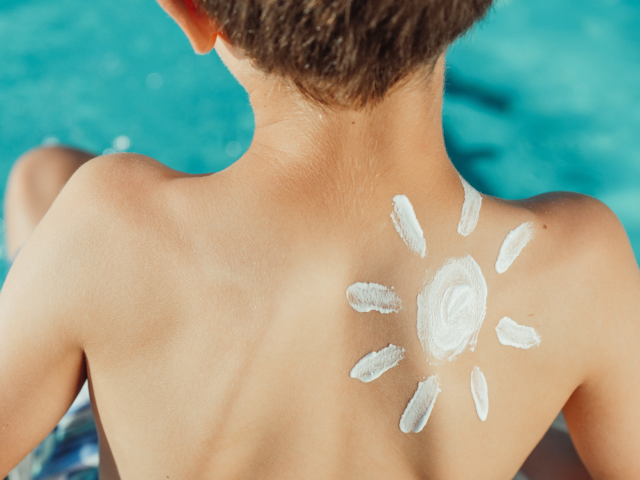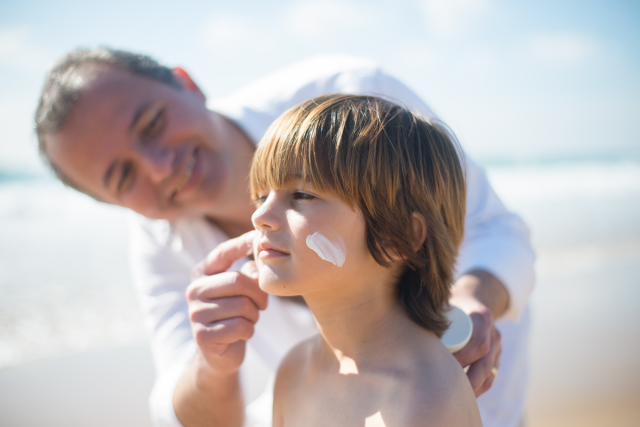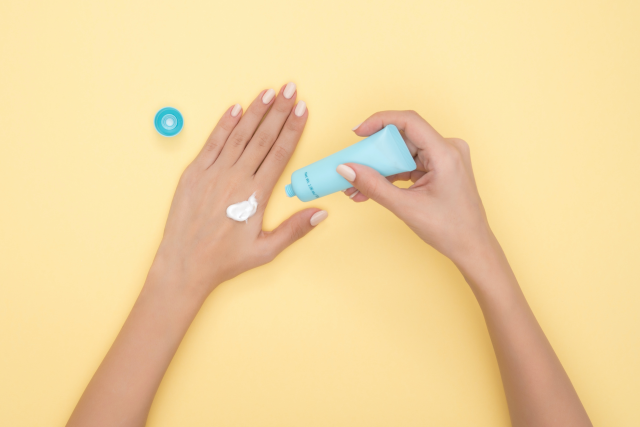
When sunscreen is applied correctly, it protects your skin from the harmful effects of the sun. In this article, you will find answers to questions such as how to apply sunscreen, what steps to pay attention to, and how to ensure effective sun protection. Well, How to choose sunscreen for oily skin? Which sunscreen type is best for dry skin? Professional names in Eunike Health have compiled the information for you.
When choosing sunscreen for oily skin, there are a few key factors to consider. Here are some guidelines to help you select the right sunscreen for your skin type:
Opt for a lightweight, oil-free formula: Look for sunscreens that are specifically labeled as "oil-free" or "non-comedogenic" to prevent clogging your pores and exacerbating oiliness. These formulas are usually lighter in texture and absorb more easily into the skin.

Choose a broad-spectrum sunscreen: Ensure that the sunscreen offers broad-spectrum protection, which means it shields your skin from both UVA and UVB rays. UVA rays contribute to aging and UVB rays cause sunburn, so comprehensive protection is crucial.
Look for a matte or dry-touch finish: Sunscreens that have a matte or dry-touch finish can help to control shine and keep your skin looking less greasy throughout the day. These formulations are designed to absorb excess oil and leave a more matte appearance.
Consider gel or gel-cream formulas: Gel-based or gel-cream sunscreens tend to be lighter and more suitable for oily skin. They often provide a cooling effect and are easily absorbed without leaving a heavy residue on the skin.
Non-comedogenic and hypoallergenic: Make sure the sunscreen is labeled as non-comedogenic, meaning it won't clog pores, and hypoallergenic, which reduces the chances of causing skin irritation or allergies.
Avoid heavy moisturizing sunscreens: If your skin is already oily, using a heavy moisturizing sunscreen may make it feel greasier. Instead, opt for lightweight formulas that offer sufficient hydration without adding excessive moisture.
Consider a mattifying primer: If you still find that your skin gets oily even with an oil-free sunscreen, you can apply a mattifying primer before sunscreen. This can help to control shine and create a smoother surface for the sunscreen to adhere to.
Remember to apply sunscreen generously and reapply every two hours, especially if you're exposed to sunlight for an extended period. Additionally, incorporating a regular skincare routine that includes cleansing and exfoliating can help to manage oiliness and maintain healthier skin. You can contact Eunike Health and have a skin analysis to choose the most suitable sunscreen for your skin type.

Both SPF 30 and SPF 50 provide effective sun protection, but the choice between the two is not directly related to skin type. SPF (Sun Protection Factor) primarily indicates the level of protection against UVB rays, which are responsible for sunburn. Here's what you should consider when choosing between SPF 30 and SPF 50 for oily skin:
Adequate Protection: Both SPF 30 and SPF 50 offer high levels of protection against UVB rays. SPF 30 filters out approximately 97% of UVB rays, while SPF 50 filters out around 98%. The difference in protection is relatively minimal, but every additional percentage of protection counts.
Personal Sensitivity: If you have oily skin that is particularly sensitive to the sun or prone to sunburn, you may opt for the higher protection provided by SPF 50. It offers a slightly greater margin of safety against sunburn, which can be beneficial if you spend extended periods outdoors or have a history of sunburn.
Reapplication and Behavior: Regardless of the SPF, it's important to reapply sunscreen every two hours or as directed on the product label, especially if you have oily skin. Oily skin tends to produce more sebum, which can potentially break down sunscreen and reduce its effectiveness over time. By reapplying sunscreen regularly, you ensure continuous protection regardless of the initial SPF level.
Matte Formulations: Consider using a sunscreen with a matte finish specifically designed for oily skin. These formulations often have oil-absorbing properties and can help control excess shine throughout the day.
Other Factors: Apart from SPF, it's crucial to consider other aspects of the sunscreen formulation, such as being oil-free or non-comedogenic, to avoid clogging pores or exacerbating oily skin concerns.
Ultimately, the decision between SPF 30 and SPF 50 depends on personal preference, level of sun sensitivity, and the specific needs of your skin. Regardless of the chosen SPF, remember to apply sunscreen generously, reapply regularly, and combine it with other sun protection measures such as seeking shade, wearing protective clothing, and using sunglasses. You can contact Eunike Health and have a skin analysis to choose the most suitable sunscreen for your skin type.

When selecting a sunscreen for dry skin, it's important to choose a formulation that provides hydration and nourishment to help address the dryness. Here are some tips for choosing a sunscreen suitable for dry skin:
Look for moisturizing ingredients: Opt for sunscreens that contain moisturizing ingredients such as glycerin, hyaluronic acid, aloe vera, or ceramides. These ingredients help to hydrate and replenish dry skin, keeping it moisturized throughout the day.
Choose a cream or lotion sunscreen: Cream-based or lotion sunscreens are often more emollient and provide a thicker consistency that can be beneficial for dry skin. They tend to provide a protective barrier and help lock in moisture, preventing further dehydration.
Consider a sunscreen with added antioxidants: Some sunscreens include antioxidants like vitamin E or green tea extract. These ingredients can help nourish and protect the skin from free radicals, which can contribute to dryness and premature aging.
Avoid alcohol-based or heavily fragranced sunscreens: These ingredients can be drying and potentially irritating for dry skin. Opt for fragrance-free or hypoallergenic sunscreens to minimize the risk of skin irritation or sensitivity.
Choose a broad-spectrum sunscreen with SPF 30 or higher: Ensure the sunscreen provides protection against both UVA and UVB rays. UVA rays can contribute to dryness and aging, while UVB rays can cause sunburn. A minimum SPF of 30 is recommended for adequate protection.
Consider a tinted or mineral sunscreen: Tinted sunscreens can offer additional hydration and provide a subtle tint that helps even out the skin tone. Mineral sunscreens containing zinc oxide or titanium dioxide are generally gentle on dry and sensitive skin types.
Apply sunscreen on well-moisturized skin: Before applying sunscreen, make sure your skin is adequately moisturized. Apply a gentle moisturizer suitable for dry skin and give it a few minutes to absorb before applying sunscreen on top.
Remember to reapply sunscreen every two hours or as directed on the product label, especially if you have dry skin. Additionally, if you have any specific concerns or sensitivities, it's best to consult with a dermatologist for personalized recommendations.
According to skin analysts to apply sunscreen is crucial for several reasons:
Protection against harmful UV rays: Sunscreen helps protect your skin from the damaging effects of ultraviolet (UV) radiation emitted by the sun. There are two types of UV rays that can harm your skin: UVA and UVB. UVA rays can prematurely age your skin, leading to wrinkles, fine lines, and age spots. UVB rays are primarily responsible for sunburns. Prolonged exposure to UV radiation increases the risk of skin cancer, including melanoma, the most dangerous form of skin cancer. Sunscreen acts as a barrier, reducing the penetration of UV rays and minimizing their harmful effects.
Prevention of sunburn: Sunburn is a visible sign of skin damage caused by excessive exposure to UV radiation. It can cause pain, redness, peeling, and blistering, and in severe cases, it may even require medical attention. Sunscreen with a sufficient sun protection factor (SPF) helps prevent sunburn by blocking or absorbing UVB rays.
Reduction of skin cancer risk: Regular and proper use of sunscreen has been shown to reduce the risk of developing various types of skin cancer, including squamous cell carcinoma, basal cell carcinoma, and melanoma. Skin cancer is one of the most common types of cancer globally, and protecting your skin from the sun's harmful rays is an essential step in its prevention.
Prevention of premature aging: Exposure to the sun's UV rays accelerates the aging process of the skin. It can lead to the formation of wrinkles, fine lines, age spots, and a loss of elasticity. By applying sunscreen daily, you can help prevent premature aging and maintain a more youthful appearance.
Protection against photoallergic and phototoxic reactions: Some individuals may experience adverse reactions to sun exposure, such as photoallergic or phototoxic reactions. These reactions can cause rashes, itching, redness, and swelling on the exposed areas of the skin. Sunscreen can provide a protective barrier, reducing the risk of such reactions.
Remember to apply sunscreen generously to all exposed areas of your skin, even on cloudy or overcast days, as UV rays can still penetrate through clouds and cause damage. Reapply sunscreen every two hours or as directed on the product label, especially after swimming or sweating.
Son Dakika › Advertorial Sondakika › What kind of sunscreen should oily skin use? Is SPF 30 or 50 better for oily and skin? How to choose sunscreen for oily skin? - Son Dakika
Sizin düşünceleriniz neler ?